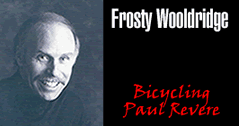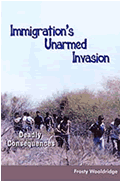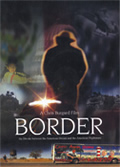PEAK EVERYTHING: WAKING UP TO THE CENTURY OF DECLINES
By Frosty
Wooldridge
November 20, 2008
NewsWithViews.com
A book review
Everything in 20th century America pointed toward progress, growth, goods and services. Each generation enjoyed bigger houses, more cars and higher standards of living. Parents assured their kids, “You’re gonna’ have a better life than we did.” The human race raised its eyes to the moon, and amazingly, walked on it!
Up until 1975, Americans assumed everything and anything--possible!
However, in the 21st century, as the adage laments, “Everything that goes up, must come down.”
In Richard Heinberg’s “Peak Everything: Waking Up to a Century of Declines,” readers face sobering realities concerning the end of the “Age of Oil.” Heinberg alerts Americans with, “Peak oil refers to that moment in time when the world will achieve its maximum possible rate of oil extraction; from then on, for reasons having mostly to do with geology, the amount of petroleum available to society on a daily or yearly basis will begin to dwindle. An increasing number of analysts agree that it is happening now.”
Any sixth grader may watch Charles Gibson, Katie Couric and Brian Williams nightly with a degree of concern for their future. Not only do 21st century citizens face oil declines, they confront less grain production, climate instability, less fresh water availability, dwindling arable land, wild fish reserves and metals.
Ironically, in the forthcoming decade of “growing troubles” leading toward 2020, instead of declines, Heinberg points out “not-so-good” things accelerating: economic inequality, environmental destruction and greenhouse gas emissions.
What grows as our number one task in the 21st century?
“A conclusion of startling plainness presents itself: our central survival task for the decades ahead, as individuals and as a species, must be to make a transition away from the use of fossil fuels---and to do this as peacefully, equitably and intelligently as possible,” Heinberg said.
If we don’t solve those issues, humans will most likely be struggling for their very survival on a primitive level. Heinberg calls it “The Rude Awakening.” He illustrates how we think our society maintains a ‘normal’ life pattern with cars and homes powered by fossil fuels. They cannot and will not last!
“The great transition of the 21st century will entail enormous adjustments on the part of every individual, family and community…and we must plan rationally,” Heinberg said. “…moving toward contraction and sustainability.”
Heinberg offers a sobering thought that relates to the human experience down through the ages, “We humans tend to learn really tough lessons only by bitter experience.”
In our coming transition, we expect 50 million farmers: “One way or another, re-ruralization will be the dominant social trend of the 21st century.” Why? Oil will not be available to run our tractors! As a farm boy, I know what it means to hoe rows of potatoes and cucumbers! Grab your Oshkosh by gosh overhauls; you will need them!
Heinberg doesn’t mince words when he talks about the survival of humanity. He offers four points for long term sustainability. All of them, today, we break on a daily basis.
In order to maintain civilization:
1.
Nature’s functions and diversity are not systematically subject
to increasing concentration of substances extracted from the earth’s
crust.
2.
Nature’s functions and diversity are not subject to increasing
concentrations of substances produced by society.
3.
Nature’s functions and diversity are not systematically impoverished
by physical displacement, over-harvesting, or other forms of ecosystem
manipulation.
4.
People are not subject to conditions that systematically undermine
their capacity to meet their needs.
Midway through the book, Heinberg introduces the wisdom of Thomas Malthus, “The power of population is so superior to the power of earth to produce subsistence for humanity that premature death must in some shape or other visit the human race.”
While many argue the veracity of Malthus, none can escape his harsh realities as they play out on the planet today as 18 million humans starve to death annually. At the same time, human encroachment on habitat causes the extinction of 100 species DAILY around the globe. Other luminaries such as Dr. Albert Bartlett and Paul Ehrlich support everything Malthus proposed. Without a doubt, Darwin’s interplay provides us with brutal realities that most certainly point toward the human race—if we continue our fecundity at current rates of speed. As Heinberg stated, “The longer we wait, the fewer our options.”
With precise research, Heinberg reiterates our falling oil availability and climate change. Both portend ominous challenges in the coming years. Without a new energy source, we face returns to simpler times based on farming communities, less travel and food production at the local level for local survival.
In Heinberg’s critique of Tom Brokaw’s “Greatest Generation” book, he argues that the WWII generation coupled with the Baby Boomers—created the most destructive civilization on Earth. As a Boomer myself, I agree!
At the end of the book, Heinberg writes a letter from 100 years into the future back to 2008. He writes that our leaders created wars to protect the “American Way of Life.” Nothing could do that! The “American Way of Life” constituted THE problem. Millions of people died in those wars. Later, his letter refers to climate change that caused “The Pruning,” “The Purification,” or “The Cleansing.” Those constitute euphemistic terms for wars, epidemics and famines!
He laments the loss of knowledge and more, “A few of our young people wonder what it must have been like to live in a world of jet airplanes, electricity and cars.”
At the end of his letter back to those of us living today, Heinberg wrote, “Can you change my past, which is your future?”
While Heinberg’s book proves depressing or should I say ‘sobering’, his prose flickers like that robot’s eye coming back to life in Arnold Schwarzenegger’s first Terminator movie when all seemed lost. By reading the letter, could we save a forest or plant a seed? Could we change course to alter our future so his letter might be full of an abundant life lived? Could we, by our actions, alter the Chaos Theory? Small changes in initial conditions can lead to big changes in outcomes.
In Heinberg’s last chapter, “Talking Ourselves to Extinction”, he presents our most powerful weapon, language, to create change toward sustainability. We must talk to one another, person to person, country to country, humanity to humanity.
This book provides the impetus for initiating ‘large changes’ that lead to big outcomes. Heinberg’s electrifying prose, compelling presentation and rational solutions bring hope to readers. In the end, hope coupled with action may very well alter humanity’s history toward a viable and sustainable future. Let’s get busy!
|
Subscribe to the NewsWithViews Daily News Alerts! |
“Humanity can no longer race without reason--like with Running of the Bulls in Pamplona, Spain--just for the kicks of it and hope to survive to tell the tale. Heinberg depicts what’s coming and what actions we must take in order to create a sustainable future. It may not be too late, but it’s pretty close! Every citizen and world leader needs to read this book to create a consciousness shift toward a sustainable future.” Frosty Wooldridge, six continent bicycle traveler
Peak Everything: Waking Up to a Century of Declines
By
Richard Heinberg
· ISBN-10: 086571598X
· ISBN-13: 978-0865715981















